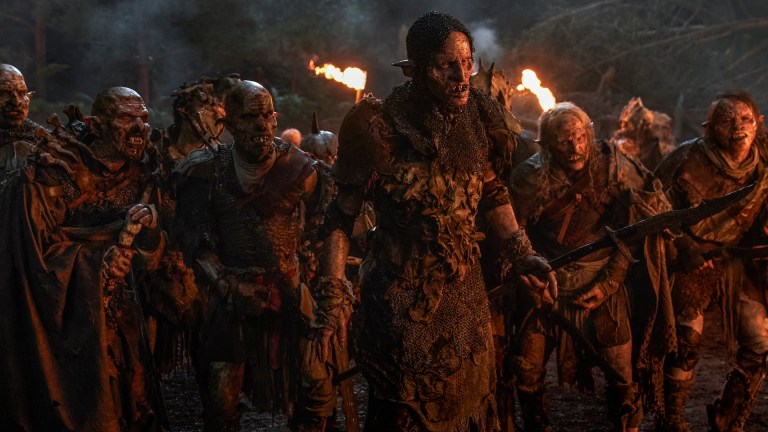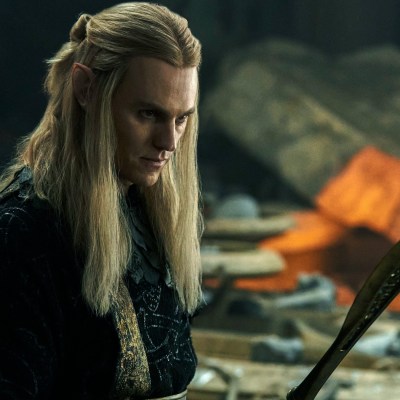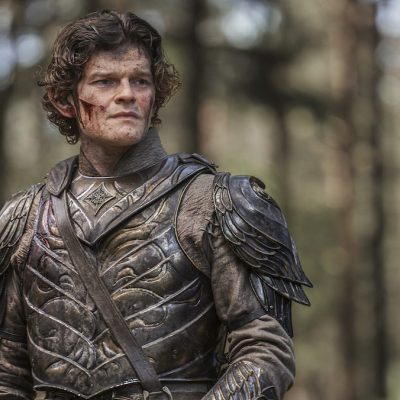The Rings of Power Season 2 Episode 8 Review: Durin’s Bane and the Stranger’s Name
The Rings of Power sets up The Lord of the Rings trilogy in an uneven, but effective season 2 finale.

This review contains spoilers for The Lord of the Rings: The rings of Power season 2 episode 8.
The Rings of Power season 2 episode 8 is a bit of a mixed bag, as season finales often are. There are some epic scenes and beautiful moments in here, along with some slightly wobblier ones.
One of the most exciting scenes in this episode is the opening, in which we get to see how the Balrog got its nickname, Durin’s Bane. It’s great to witness the Balrog in all its glory, with all Tolkien’s contradictory bits and pieces of physical description, including the fact it has wings but cannot fly, being honored. Like Peter Jackson’s version, this Balrog has shadowy, smoky wings as well as its flaming sword and fiery whip. The Balrog fight and the tear-jerking final scene between Durins III and IV (Peter Mullan and Owain Arthur) is all very well done and a great start to the episode.
The other particularly effective scene is poor old Celebrimbor’s swan song. Charles Edwards has put in a brilliant performance as Celebrimbor this season. He will be much missed, and as ever, Celebrimbor and Sauron’s (Charlie Vickers) scenes are a highlight. Seeing Celebrimbor being used for target practice is a useful reminder that Sauron is Evil with a capital “E,” no matter how attractive or well-intentioned he makes himself appear to be. And at least Celebrimbor gets a great death scene, predicting the entire Middle-earth saga in a few words as his last dying attack on Sauron. Even a slightly cheesy double title-drop of both “the Rings of Power” and “the Lord of the Rings” can’t distract from the drama of that moment.
Elsewhere, we can all breathe a sigh of relief and stop calling the Stranger (Daniel Weyman) “Probably-Gandalf,” as his identity has finally been confirmed and he has adopted his most well-known name. Tolkien derived the name “Gandalf” from the real-world Elder Edda, a collection of poems written in Old Norse. It’s also the name of a 9th century king of southern Sweden and southern Norway. In the poem Völuspá, Gandalfr is a dwarf, and Tolkien originally gave the name to the leader of the Dwarves (eventually Thorin Oakenshield), with the wizard going by the odd-sounding “Bladorthin.” Tolkien’s notes do not explain exactly why he changed his mind, but it may have had something to do with the meaning of the name Gandalfr in Old Norse, which comes from “gandr,” meaning “magic staff,” and “álfr,” meaning “elf;” so, “elf with a magic staff.”
It seems ironic that The Rings of Power has finally revealed Gandalf’s name and identity in an episode that is also very interested in his staff, but it doesn’t connect the two. Of all the things that might have annoyed Tolkien in this adaptation of his work, we can’t help but think that the claim “Gandalf” means “Grand-Elf” might have annoyed him the most. It is half-right, and he was called “Gandalf” in the North, which is presumably where the Stoors and Harfoots will all eventually end up, so it’s not completely out of left field. But Tolkien was very protective of his languages!
Whatever the derivation of the name, putting the question of the Stranger’s identity to rest was long overdue, and it had become increasingly obvious who he was over the course of this season anyway. The exact identity of the Dark Wizard (Ciarán Hinds) remains a mystery, but a more interesting one, as he is probably one of the little known Blue Wizards. That gives the series lots of leeway to do more or less what they want with the character, since Tolkien kept changing his mind about what was going on with the Blue Wizards anyway. We do get a lovely little hint that the show version is very much on the dark side with a Tolkien deep cut – the Dark Wizard insists that “Pity will not defeat Sauron,” but of course anyone who knows The Lord of the Rings knows that the pity of Bilbo, Frodo, and Sam in sparing Gollum’s life is exactly what does, indirectly, defeat Sauron in the end.
Galadriel’s (Morfydd Clark) scenes in this episode are more of a mixed bag. On the positive side, it was nice to see another confrontation between her and Sauron after they have been split up all season. Charlie Vickers continues to do fascinating work in making Sauron’s different avatars appear to be entirely different personalities, and it’s a guessing game for the audience whether any of them represent anything close to the “real” him. When she confronts him with his “illusions” he morphs back into Halbrand and says that “not all of it” was an illusion, implying that he really did have some feelings for Galadriel, something also implied by his weird creeping over Mirdania earlier in the season. But this is still Sauron the Deceiver – so each individual viewer will have to make up their own mind whether he is really telling the truth or not here, and that’s fascinating.
The rest of Galadriel’s story, however, is not so good. Her tactical and military decisions continue to be completely baffling, and she gives herself up so easily that Sauron barely has to break a sweat to get the Nine Rings from her, and poor Celebrimbor’s noble sacrifice was for nothing. She is also apparently almost indestructible, judging by the fall she survives. It is implied that Elrond (Robert Aramayo) and Gil-galad (Benjamin Walker) heal her using the Rings in the same way Elrond would later heal Frodo in The Lord of the Rings, but that does not explain how she survived the fall in the first place, other than she was wearing plot armour.
The biggest flaw in season 2 of The Rings of Power as a whole is that it doesn’t seem to know what to do with its main character. Tolkien’s Galadriel is the only Ringbearer to hang on to her Ring of Power from beginning to end, but in this series her Ring, Nenya, has already gone through her, Elrond, and Adar (Sam Hazeldine) briefly, and she can’t seem to hang on to it. She has spent the whole of season 2 lurching from one camp to another, and the most memorable thing she has done all season is snog her son-in-law. None of this is Morfydd Clark’s fault, who is doing a good job with the material – but we would like some better storylines for Galadriel, in which she does not come across as quite so stupid, in season 3 please.
Other characters’ stories have also been a little patchy, but most resolve in a fairly satisfying way. Isildur’s adventures were one of the season’s quieter storylines, but well acted by Maxim Baldry and he’s had some good character development on his journey towards becoming king, learning to balance love and duty. The writers even managed to make his beloved horse Beric key to his closing scenes!
We’re glad to see that Arondir (Ismael Cruz Córdova) is still alive after last week, as it feels like that character has not yet quite realized his potential. The decision to write out Bronwyn rather than re-cast her has left him without his primary driving force and main storyline and he has floundered a bit, but he’s becoming quite likable, and it would be good to see him get a clearer character arc next season. Theo (Tyroe Muhafidin) has fared even worse from losing Bronwyn, as it is difficult to invest in his story without her much more grounded character to anchor it, but we will see where he goes in the future if the show is renewed.
Meanwhile Elrond’s relationship with the Dwarves has hopefully been saved by their very, very late but very welcome arrival to the battle in Eregion, and Númenor is sliding further down a slippery slope into religious persecution. Whether Elendil’s daughter Eärien (Ema Horvath) has done enough to redeem herself in the eyes of the audience for her poor choices this season by saving him right at the end remains to be seen, but it’s nice to see Elendil (Lloyd Owen) pick up his famous sword Narsil, still in one piece for now.
The episode suffers a tiny bit from the problem that famously plagued its forerunner The Return of the King: too many endings. It reaches a perfect, optimistic, Tolkien-feeling ending as Gandalf and Tom Bombadil (Rory Kinnear) sing Tolkien’s own words together. This scene is also a rare thing in this prequel show, a moment that gives us a feeling of hope and optimism. It is the curse of prequels that they have to show us how the world got into whatever mess it was in when the original story started, meaning they are usually covering a fairly depressing tale of loss and destruction, which will not be resolved until the heroes of the original story come along to fix it. But anything involving Gandalf – now that we know it is him – reminds us that good will, eventually, triumph in the end and that what these characters do now will matter in the future.
But then the episode goes on a bit more. Its actual ending is quite nice too and aims for the same sense of cautious optimism, as Galadriel affirms that, “the sun yet shines.” And Gil-galad makes a joke, continuing the very welcome injection of humor and humanity (or Elf-ness) into even the most serious characters over the course of this season. But that scene with Gandalf and Bombadil was just perfect. Ultimately, the show usually shines the most when it gets back to Tolkien’s words and Tolkien’s themes.
Learn more about Den of Geek’s review process and why you can trust our recommendations here.


